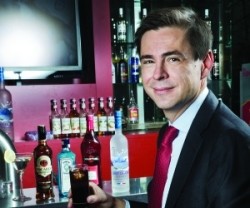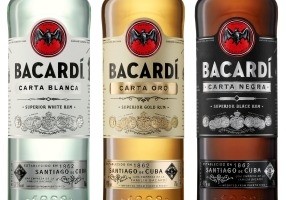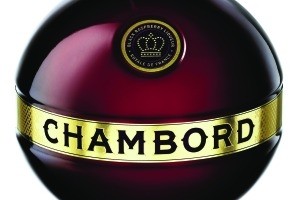The Big Interview: Stefan Bomhard, Bacardi

Bomhard began reading the text with interest and, captivated by the Bacardi family’s story and the amount of upheaval they had experienced, he empathised.
In his own life, he and his family had also encountered their fair share of upheaval with his job in marketing in the hospitality industry sending them all from London to Germany, to Russia, Miami, Madrid and also the Netherlands.
Carving out a path in the industry you love is not always easy. For Bomhard, the fact that his family made each journey with him was very much appreciated.
“Then, a wonderful opportunity appeared,” says Bomhard.
“I was reading the Bacardi book and four months later I was approached about whether I’d like to talk to Bacardi about a job. So, I suppose, there was an element of fate in joining the company.”
For a man who admits his career in hospitality began as “a really bad waiter” in his teens, Bomhard — now with a degree in European business administration and a PhD in European marketing — has certainly played a large part in shaping some successful brands.
“I was 19 when I came to London as a student and I enjoyed the UK’s pub culture very much. It was good fun,” he says with a grin. “I was fascinated by how civilised everyone was about closing hours at 11pm.”
When Bomhard went back to Germany, he started working in marketing for Procter & Gamble’s (P&G’s) food and beverage business. “I worked briefly for P&G in Newcastle-upon-Tyne, then moved to Russia for the company and then left to join Diageo in Uxbridge, west London,” he says, explaining, “it had just merged with Grand Metropolitan and Guinness and I joined the company as vice-president of marketing in Europe, the Middle East & Africa for Burger King [which was then still owned by Diageo]”.
Not long afterwards, there was the chance for Bomhard to run things in Miami where the Burger King head office was based.
He jumped at the chance and took his family with him to sunnier climes while becoming senior vice-president of marketing in North America. “As an English winter approached, it wasn’t a difficult choice to make,” he admits, and reminisces fondly.
“It was a marketer’s dream and really good fun. It was all about turning the Burger King brand in the right direction and re-establishing the Whopper.
“In my Burger King years, I fell in love with foodservice, hospitality and the on-trade. Then, when I joined Unilever’s foodservice and hospitality division, it was a business within a business, the second largest after Nestlé and a sector serving the on-trade.”
Bomhard joined as head of marketing and sales worldwide. “It was all about setting up the key account structure, so McDonald’s, Mitchells & Butlers and UK pubs. It was fascinating because everything was different. Some places wanted things based on cost, others wanted to know what to do to drive revenue or footfall and build traffic by getting people to trade up.”
Then, the opportunity came to join Cadbury. “I joined its executive committee and became chief commercial officer worldwide, looking after sales and marketing.”
The ‘global office’ was back in Uxbridge and Bomhard and his family already knew the area. Everything seemed ideal, perhaps apart from the timing.
Shortly after Bomhard joined the company, Kraft made a hostile takeover bid for Cadbury and he was suddenly thrown into a situation where he was “sitting with the CEO and the core team and fighting through”.
It was a business episode that, even though it was ultimately unsuccessful, Bomhard pragmatically describes as both an “outstanding and lasting experience”.
Kraft offered him a job to stay with the company, which at first he accepted, running its coffee business in Europe before his serendipitous encounter with Bacardi.
“I enjoy every minute working for Bacardi,” says Bomhard, sounding every bit a satisfied man. “It’s not just because the industry is great, or that the role has variety, or even that the company creates very social products. It’s because the Bacardi company is very special. It’s fascinating.”
Bomhard explains that, for him, because Bacardi is also a family-owned firm, he believes it has a longer-term approach to how it runs its business, and those values matter to him too.
“Bacardi won’t just disappear because the shareholders want their last 10p,” says Bomhard. “At Bacardi, the love of the liquid and the product is incredible and, during our 150th anniversary, the eight family master blenders got together and agreed on the blend of a $2,000 (£1,243) bottle. This was a family that got together to create something and celebrate their achievements. It’s inspiring.”
And the family didn’t just get together and pick the barrels, they blended them together too.
“What they do is their passion and their love,” says Bomhard, pointing out that all the blenders are also family members.
“The Bacardi family really does care about the quality of the product over everything else too. What makes Bacardi different is — it’s the name of the family on the bottle. This is a unique situation.
“One interesting challenge in the UK has been that the brand has been so successful that it became a category of its own. Sometimes that strong linkage to rum was not clear to all consumers,” says Bomhard.
“The 150th anniversary was the perfect chance to remind everyone that Bacardi Superior comes from the number-one rum company in the world and that the impact it had across the bar landscape created a whole genre of cocktails that have since followed.”
Bacardi Superior is not just the most successful product from a family of rums, it is also the most awarded rum in the world too.
“We really want to make sure that consumers understand it is a rum. One of the trends over the past few years has been towards dark rums and spirits and, although rums existed before Bacardi arrived on the scene, they were all dark and harsh,” says Bomhard.
He highlights that “what Facundo Bacardi [the founder of the Bacardi rum distillery in 1862] did was attain the highest quality by removing all of the impurities from the rum. And, based on that, he created something you could mix, and mix well”.
Bomhard agrees that people often see cocktails as the upper end of the trade, but insists that they would still love to have a similar experience at their pub.
“When you look at some of the innovations of the past year — such as the Bacardi Mojito cocktail in a bottle or the Cuba Libre — it is our attempt to help the trade to replicate a cocktail experience in a local pub,” says Bomhard, adding that Bacardi believes in its ability to create what he calls ‘cocktail culture’ anywhere.
“As a supplier, we often just want to know how we can help,” says Bomhard, hinting that with the big gastropub trend now in the UK, most people are differentiating via food, but there are other ways to stand out from the crowd.
“I argue that perhaps there is more opportunity left to differentiate with your beverages. Cocktail culture is a way to differentiate yourself too and, if you look at the longer term trends, it’s clear to see that spirits are gaining on beer and wine.”





